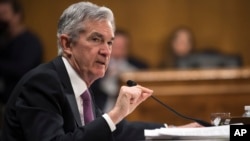Federal Reserve Chairman Jerome Powell said Friday that the healthy U.S. economy and low inflation are allowing the central bank to take a “patient, wait-and-see approach” on interest rates.
Speaking at Stanford University, Powell said the Fed is well along in its effort to normalize Fed operations by scaling back the extraordinary efforts it employed to support the economy’s recovery from the Great Recession.
The Fed is trimming its sizable holdings of Treasury bonds and mortgage-backed securities. Officials are discussing a plan for wrapping up the efforts to reduce the central bank’s balance sheet later this year, Powell said, adding that the plan’s details should be announced soon.
The Fed’s moves to reduce its balance sheet, which hit a peak of $4.5 trillion, are being watched closely by investors.
Slimming its balance sheet
The Fed started in October 2017 reducing the balance sheet by allowing some bonds to run off as they matured. The balance sheet is now around $4 trillion but some investors have worried that the Fed could end up driving long-term interest rates higher and harming the economy by going too far in reducing its holdings.
Some analysts have projected the Fed’s balance sheet will end up being around $3.5 trillion, which would be significantly higher than the less than $1 trillion it held before the financial crisis hit in 2008.
Powell said the size of the holdings will “prove ample” to meet the Fed’s needs of supplying reserves to the banking system and he said “we could be near that level later this year.”
“As we feel our way cautiously to this goal, we will move transparently and predictably in order to minimize needless market disruption,” Powell said.
Updating procedures
The Fed is conducting a yearlong review of its procedures as part of its effort to update its operations in areas such as the way it communicates with the public, Powell said.
One area being examined is whether the Fed should consider altering its inflation target, which is currently a goal of annual price increases of 2 percent, to allow inflation to go above that goal for a time.
Powell did not specifically discuss the course of rate hikes other than to repeat the “patient” pledge the Fed began using in January to signal that it was planning a prolonged pause in hiking rates this year after boosting them four times in 2018.
Some analysts believe the Fed could leave its policy rate unchanged for the entire year and could possibly start cutting rates in 2020 if the economy slows significantly as the effects of the Trump administration tax cuts and a boost in government spending fade.
The rate hikes last year prompted strong criticism from President Donald Trump who charged that the rate increases were driving down the stock market.
In his remarks, Powell said, “We live in a time of intense scrutiny and declining trust in public institutions around the world. At the Fed, we are committed to working hard to build and sustain the public’s trust.”




